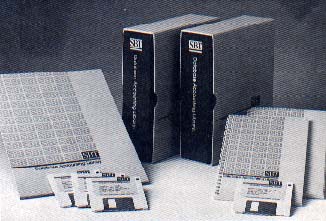Review
The SBT Database Accounting Library
A Preview of a High-end Accounting Package
by Jeffrey DanieIs
The Atari ST, even with the advent of the Mega line, has thus far failed to appear in more than negligible numbers on the desktops of America's corporate movers and shakers. Yet as every ST user is aware, the machines absence in the business world cannot be blamed on hardware: as a pure computing engine the ST can certainly hold its own against comparisons with most mainstream personal computers.
Then why hasn't the ST won the hearts, minds and purchase orders of corporate managers? Allowing for the prevalence of IBM-itis in the corporate mindset doesn't explain enough. Heretofore the missing component has been high-quality, well-entrenched, well-supported business and financial software.
For this reason we at START were quite excited when we heard that the SBT Database Accounting Library--a powerful, sophisticated, high-end accounting package--was in development and in limited release for the ST. Though as of this writing (July 1988) it's still a beta product, prospects for an imminent SBT release are promising.
 |
| The SBT Database Accounting Library: a powerful, sophisticated, high-end accounting package far the ST. |
The SBT Database Accounting Library is real software for real businesses, not some dressed-up home package. This is the kind of software that helps run multi-million dollar corporations; the kind of software that makes slick, red-suspendered corporate CPA's look good. In short, the kind of systems accounting software than runs on serious machines in serious environments, outputting serious reports about serious sums of money.
What follows is a preview of the SBT package; in the sidebar accompanying this article is an interview with SBT Software's President, Robert H. Davies. Although I'm familiar with SBT on the IBM PC, I feel it's fair only to preview the product now. A full review will appear in START as soon as SBT is available on the ST.
What Is The SBT Database Accounting library?
Originally written for the IBM PC, the SBT Database Accounting Library is a dBASE-based application (on the ST, of course, it runs under dBMAN). Its fully integrated, modular design provides unparalleled power and flexibility. And because it's written in dBASE, the package is easily customized to a particular business's requirements.
Forming the heart of the SBT accounting solution are four SBT main modules: dredger, dInvoice/dStatements, dPayables and dPayroll. However, you can run any of the modules separately and add modules as the need arises. The software provides accounting for up to 99 separate companies with up to 999 departments. Preprinted forms (invoices, credit memos, statements, checks, etc.) tailored specifically to the various SBT programs are widely available from various third-party distributors.
dLedger
dLedger provides complete general ledger and financial reporting with user-defined ledger accounts, consolidated and departmental income statements, comparative balance sheets and automatic distribution entries based on user-defined percentages. The module maintains period-to-date and year-to-date balances for two full fiscal years and offers automatic budget generation and maintenance. In addition, dLedger allows a user-specified printing sequence for income statements and balance sheets. It also supports non-profit accounting.
dInvoice/dStatements
dInvoice/dStatements performs billing, inventory control and accounts receivable. The module provides high-speed look-up of customer and inventory code numbers. It reports aged receivables, cash receipts, deposits, inventory reorders and back orders, as well as sales and gross margin by item, customer and salesperson. dInvoice/dStatements allows multiple ship-to addresses, extensive free-form invoice and credit-memo comments and point-of-sale billing. It will print inventory reorder, aged inventory and dead-stock reports. It prints or displays customer ledger accounts on demand and prints or repents invoices and customer statements on request. Customer and inventory labels are printed at the touch of a few keys.
dPayables
dPayables tracks accounts payables and writes checks. The module allows selection and payment of invoices by discount, due date, or invoice number. It provides detailed distribution reports by expense and cash accounts and allows automatic entry of recurring expenses. Checks are printed by pay priority, in user-defined order and the module allows for manual and voided checks, as well as partial payments of payables. dPayables displays total balance and total approved-to-pay status; it also automatically maintains records of handwritten and canceled checks.
dPayroll
dPayroll calculates and maintains payroll and labor distribution. The program automatically maintains employees' federal, state and local taxes and other payroll deductions. It calculates gross earnings for regular and overtime hours, salary and piece work. It will print vacation, supplemental and termination checks in user-defined formats. dPayroll supports pretax deductions for pension plans, IRAs, Keoghs and 401(k)s. Finally, the program automatically accrues and charges vacation and sick pay.
Additional Modules
The other SBT modules are: dOrders (creates, schedules and maintains sales orders and backlogs), dPurchase (writes purchase orders and handles receiving). dMaterials (provides bill of materials maintenance with up to 100 levels of subassemblies and extension to gross requirements based on orders entered), dProfessional (provides complete time and billing accounting with balance-forward accounts receivable), dProperty (provides accounts receivable for up to 999 properties with a maximum of 999,999 units for each property), dAssets (maintains records for each asset and calculates depreciation), dProject (offers fast and flexible budgeting and cost accounting for project and job cost management) and finally, dMenu/ dBackup (provides a central menu for all SBT program modules and any other dBASE [i.e., dBMAN] applications, as well as a comprehensive backup utility . for all database data files).
Access To Source Code
When you buy an uncompiled SBT module, you can buy the program's source code: with it in your hands, customization of the program becomes only a matter of some dBASE programming. You can then compile your customized version and thereby attain the speed of a compiled program yet retain the flexibility to make changes when needed.
Compiled versions of SBT modules are also available at lower cost than for the source code versions. While the compiled modules provide high execution speed without the necessity for compilation, they cannot be customized by you.
Customer Support And Documentation
SBT's customer support program is impressive and I was consistently pleased by the support group's knowledge and response time. Technical support is free to all registered users and the company offers the only five-year warranty in the industry. SBT training seminars are held throughout the country.
The SBT documentation is clear and concise. The technical reference manuals are wonderfully detailed and provide full disclosure of file structures and the relations between files. You can also purchase machine-readable versions of the SBT documentation from the company for a nominal fee.
In Sum. . .
I can say without hesitation or fear of exaggeration: there is no financial package for the ST or Mega computers--neither one extant, promised, nor otherwise dreamed of--that comes close to the SBT Database Accounting Library's completeness, power and flexibility.
Jeffrey Daniels is a freelance writer who specializes in stories about the computer industry. His last article for START was "3 Years With The ST, " which appeared in the Summer 1988 issue.
Products Mentioned
The SBT Database Accounting Library, $295 per main module (compiled), $395 per main module (source). Requires Atari ST (TOS in ROM) or Mega, hard disk, floppy drive and printer. SBT Corporation, One Harbor Drive, Suite 300, Sausalito, CA 94965, (415) 331-9900.
dBMAN 5.0, $249.95.Versasoft, 4340 Almaden Expressway #250, San Jose, CA 95118, (408) 723-9044.
|
